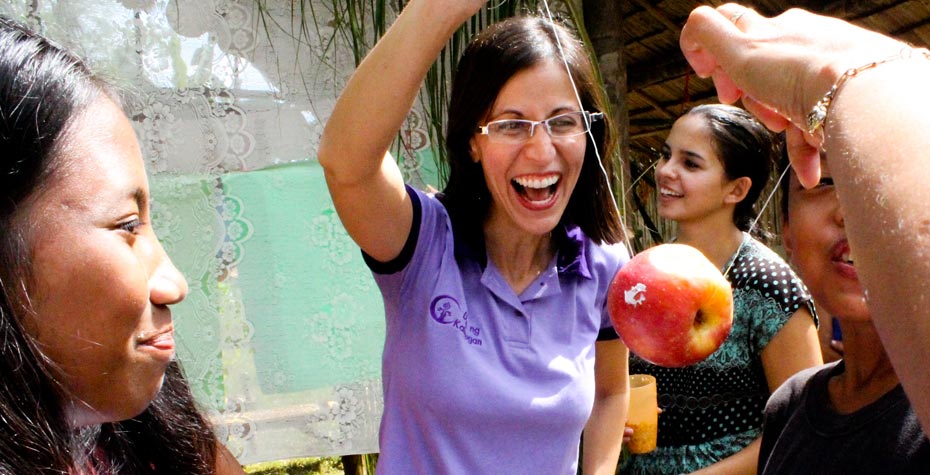Internship with Alumna-Run Nonprofit in the Philippines Inspires Albright Fellow

Thanks to the Wellesley network and the Madeleine Albright Institute for Global Affairs, Albright fellow and biological sciences major Victoria Rines ’15 spent her summer interning with Roots of Health on the provincial island of Palawan in the Philippines.
There, Wellesley alumna and Filipina-American Amina Evangelista Swanepoel ’02 embodies Wellesley’s motto—Non ministrari sed ministrare (“Not to be ministered unto but to minister”). Five years ago, Swanepoel, together with her mother (Susan Evangelista) and husband (Marcus Swanepoel) founded Roots of Health, a nonprofit organization dedicated to improving the health of women and girls, and their communities, in Puerto Princesa, Palawan.
Roots of Health, known locally as Ugat ng Kalusugan, has provided clinical services and health education to women and girls in some of the most impoverished communities in Puerto Princesa. By distributing contraceptives, teaching sex-education classes to high school and college students, training community health advocates, and providing pre- and post-natal care, Roots of Health strives to reduce the incidence of maternal mortality and the number of unplanned pregnancies in the communities of Puerto Princesa, and to empower women and girls to make informed decisions about their bodies and their health.
Rines first learned of the opportunity with Roots of Health from a Wellesley Center for Work and Service counselor who connected her to Swanepoel, and she was encouraged to pursue it by Mellon Postdoctoral Fellow in Women’s and Gender Studies Dulce Natividad.
As an intern, Rines had an opportunity to work alongside Swanepoel and says she was consistently inspired by Swanepoel’s compassion, sensible leadership, and dedication to the women and girls her organization supports. On any given day she helped with grant writing, completed data analysis projects, gave a presentation to the staff on how to conduct focus groups, or did research into potential funding opportunities. "My favorite tasks were definitely related to the collection and analysis of data!" Rines says, adding that she feels "immensely blessed" to have interned for a fellow Wellesley woman this summer. “I am continually amazed by the work that Wellesley alumnae undertake, and with such passion and poise.”
For her part, Swanepoel cites her Wellesley education as a cornerstone of her commitment to women’s health, noting that she feels fortunate to have been immersed in an environment that celebrates women, realizing that so many other women and girls in the world are denied the opportunities she was afforded. This realization fueled her interest in working with women and girls, and today, more than a decade after graduating from Wellesley, Swanepoel has merged her passions for women and girls advocacy, international affairs (she was a Japanese studies major), and public health (she holds a master's of public health from Columbia University) to form an organization that is dedicated to helping women and girls in one corner of the world achieve their full potential. Recently, Swanepoel was featured as one of Women’s Health Philippine’s “High Five” Women for her work with the communities in Puerto Princesa.
Interning with Roots of Health has clarified Rines’ desire to pursue a career in the nonprofit sector, but even more, she explains, it has reminded her that a woman with a vision can make an enormous impact. “Ami has shown me that even though there will be setbacks, and even when forward progress seems unlikely, it is important to never give in,” Rines recounts as she reflects on her summer. She is thankful for Wellesley role models like Swanepoel, and says her return to Wellesley for her final year will be bittersweet. “I am so sad to leave Palawan and all the wonderful people I have met. I sincerely hope to return someday soon!”
Swanepoel will continue to be a champion for reproductive health in the communities of Puerto Princesa as she guides Roots of Health through the challenges and successes of operating a nonprofit organization in a developing country.
